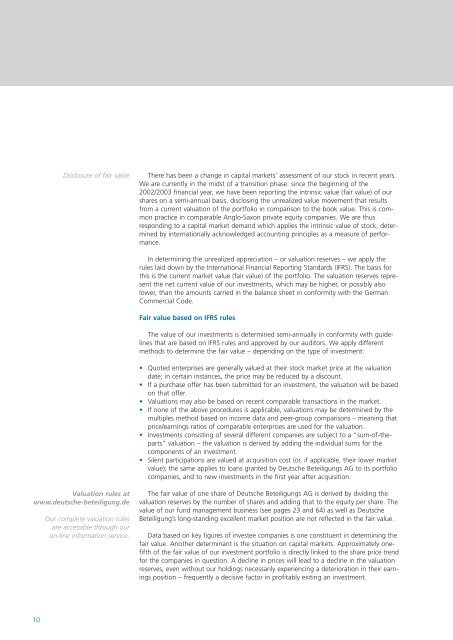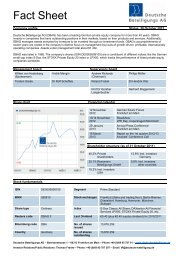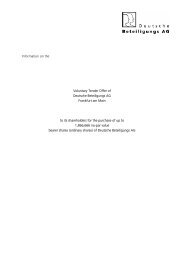Every day counts - Deutsche Beteiligungs AG
Every day counts - Deutsche Beteiligungs AG
Every day counts - Deutsche Beteiligungs AG
Create successful ePaper yourself
Turn your PDF publications into a flip-book with our unique Google optimized e-Paper software.
10<br />
Disclosure of fair value<br />
Valuation rules at<br />
www.deutsche-beteiligung.de<br />
Our complete valuation rules<br />
are accessible through our<br />
on-line information service.<br />
There has been a change in capital markets’ assessment of our stock in recent years.<br />
We are currently in the midst of a transition phase: since the beginning of the<br />
2002/2003 financial year, we have been reporting the intrinsic value (fair value) of our<br />
shares on a semi-annual basis, disclosing the unrealized value movement that results<br />
from a current valuation of the portfolio in comparison to the book value. This is common<br />
practice in comparable Anglo-Saxon private equity companies. We are thus<br />
responding to a capital market demand which applies the intrinsic value of stock, determined<br />
by internationally acknowledged accounting principles as a measure of performance.<br />
In determining the unrealized appreciation – or valuation reserves – we apply the<br />
rules laid down by the International Financial Reporting Standards (IFRS). The basis for<br />
this is the current market value (fair value) of the portfolio. The valuation reserves represent<br />
the net current value of our investments, which may be higher, or possibly also<br />
lower, than the amounts carried in the balance sheet in conformity with the German<br />
Commercial Code.<br />
Fair value based on IFRS rules<br />
The value of our investments is determined semi-annually in conformity with guidelines<br />
that are based on IFRS rules and approved by our auditors. We apply different<br />
methods to determine the fair value – depending on the type of investment:<br />
• Quoted enterprises are generally valued at their stock market price at the valuation<br />
date; in certain instances, the price may be reduced by a discount.<br />
• If a purchase offer has been submitted for an investment, the valuation will be based<br />
on that offer.<br />
• Valuations may also be based on recent comparable transactions in the market.<br />
• If none of the above procedures is applicable, valuations may be determined by the<br />
multiples method based on income data and peer-group comparisons – meaning that<br />
price/earnings ratios of comparable enterprises are used for the valuation.<br />
• Investments consisting of several different companies are subject to a “sum-of-theparts”<br />
valuation – the valuation is derived by adding the individual sums for the<br />
components of an investment.<br />
• Silent participations are valued at acquisition cost (or, if applicable, their lower market<br />
value); the same applies to loans granted by <strong>Deutsche</strong> <strong>Beteiligungs</strong> <strong>AG</strong> to its portfolio<br />
companies, and to new investments in the first year after acquisition.<br />
The fair value of one share of <strong>Deutsche</strong> <strong>Beteiligungs</strong> <strong>AG</strong> is derived by dividing the<br />
valuation reserves by the number of shares and adding that to the equity per share. The<br />
value of our fund management business (see pages 23 and 64) as well as <strong>Deutsche</strong><br />
Beteiligung’s long-standing excellent market position are not reflected in the fair value.<br />
Data based on key figures of investee companies is one constituent in determining the<br />
fair value. Another determinant is the situation on capital markets. Approximately onefifth<br />
of the fair value of our investment portfolio is directly linked to the share price trend<br />
for the companies in question. A decline in prices will lead to a decline in the valuation<br />
reserves, even without our holdings necessarily experiencing a deterioration in their earnings<br />
position – frequently a decisive factor in profitably exiting an investment.










